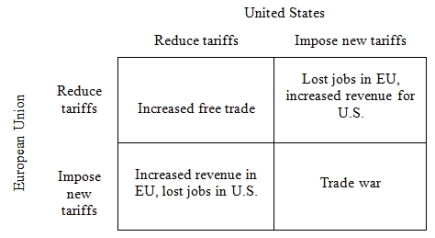Free Trade Game
Free trade occurs when goods and services between countries flow unhindered by government-imposed restrictions such as tariffs, quotas, and antidumping laws that are often designed to protect domestic industries. Although it is well known that free trade creates winners and losers, a broad consensus exists among most economists that free trade has a large and unambiguous net gain for society as a whole. For example, Robert Whaples (2006) finds in a survey of economists that "87.5% agree that the U.S. should eliminate remaining tariffs and other barriers to trade" and that "90.1% disagree with the suggestion that the U.S. should restrict employers from outsourcing work to foreign countries." Despite this consensus, it is not at all clear that countries will actually adopt policies promoting free trade.
Consider the following strategic situation in which the United States and the European Union (EU) are engaged in trade negotiations. Both countries must decide whether to reduce their tariffs or impose new tariffs. The best outcome for both countries is for them to impose new tariffs and for the other side to reduce tariffs; they could then export more easily to the other country and they would obtain increased revenue from the new tariffs. The worst outcome for both countries is for them to reduce tariffs and for the other country to increase tariffs; they would lose jobs as a result of reduced exports and the other country would benefit from their lower tariffs. Of the remaining two outcomes, both countries prefer the outcome in which they reduce tariffs to the one in which they both impose new tariffs. If both countries reduce their tariffs, then each country can benefit from increased free trade. If both countries impose new tariffs, there is a trade war in which each country sees a decline in trade and a loss of jobs. Based on this story, the preference ordering for the EU over the four possible outcomes is:
• Impose; Reduce > ; Reduce > Impose; Impose > Reduce; Impose.
And the preference ordering for the United States is:
• Reduce; Impose > Reduce; Reduce > Impose; Impose > Impose; Reduce,
where the EU's action is given first, the United States' action is given second, and ">" means "is strictly preferred to."
Using the ordinal preferences (4, 3, 2, 1) to capture these preference orderings, fill in the empty payoff matrix. Based on the preference orderings in the Free Trade Game.
Figure 1: Free Trade Game

-Using the payoffs from the Free Trade Game, what is the present value of imposing new tariffs?
Definitions:
Physical Health Benefits
The positive effects on the body resulting from healthy behaviors, such as exercise, proper nutrition, adequate sleep, and avoiding harmful substances.
Mental Health Benefits
Mental health benefits refer to the positive outcomes, such as improved mood and reduced stress, associated with engaging in activities or treatments that enhance mental well-being.
Emotion-based Coping Strategy
Approaches to managing stress that involve reducing the emotional distress caused by a situation, rather than directly addressing the problem.
Positive Reappraisal Strategy
A cognitive coping mechanism involving reinterpretation of a situation in order to see it in a more positive light or to extract positive meaning from it.
Q1: Inductive reasoning is problematic because it relies
Q7: Which of the following targeting strategies is
Q8: Which one of the following is not
Q10: A _ is an entity that uses
Q32: Major premise: If the president commits a
Q45: If the Regime believes that the Religious
Q47: What is the role of the formateur?<br>A)
Q48: The March 2007 unity or grand coalition
Q52: What answer best describes the identity of
Q144: What is a periodic inventory system?